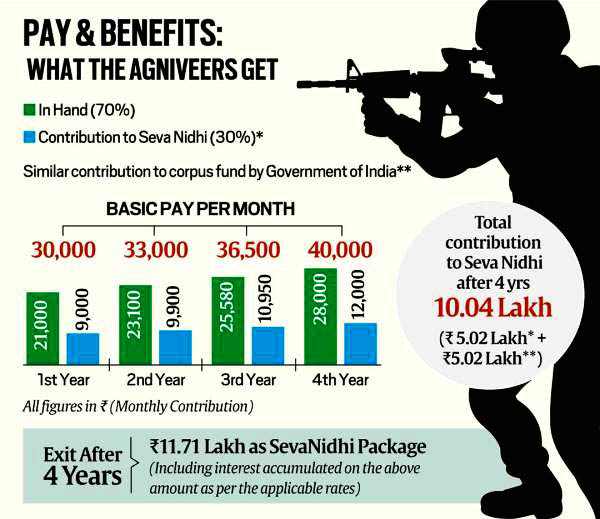Haryana Switch to Hindi
Haryana Increases Agniveer Quota
Why in News?
Recently, the Haryana government announced a 10% horizontal reservation to Agniveers in recruitment for the posts of constable and forest guard, among others.
Key Points
- Agniveers will receive 5% horizontal reservation in Group-C direct recruitments and 1% in Group-B direct recruitments for civil posts.
- Private establishments that pay Agniveers a monthly salary of 30,000 or more will receive an annual subsidy of 60,000 from the state government.
- An Agniveer starting a business will receive interest benefits on loans up to 5 lakh.
- Agniveers will be prioritized for arms licenses and employment in government departments/boards/corporations.
Agnipath Scheme
- About:
- It allows patriotic and motivated youth to serve in the Armed Forces for a period of four years.
- Under this scheme, the youth joining the army will be called Agniveer. Youth will be able to be recruited into the army for a short duration.
- Under the new scheme, around 45,000 to 50,000 soldiers will be recruited annually, and most will leave the service in just four years.
- However, after four years, only 25% of the batch will be recruited back into their respective services, for a period of 15 years.
- Eligibility Criteria:
- It is only for personnel below officer ranks (those who do not join the forces as commissioned officers).
- Commissioned officers are the army's highest ranked officers.
- Commissioned officers hold an exclusive rank in the Indian armed forces. They often hold a commission under the president's sovereign power and are officially instructed to protect the country.
- It is only for personnel below officer ranks (those who do not join the forces as commissioned officers).
- Aspirants between the ages of 17.5 years and 23 years will be eligible to apply.


Haryana Switch to Hindi
Coalition of Epidemic Preparedness Innovations
Why in News?
Recently, Asia’s first pre-clinical network facility for health research was established at the Regional Centre of Biotechnology.
- It is under the Translational Health Science & Technology Institute (THSTI) in Faridabad, as part of the Coalition of Epidemic Preparedness Innovations (CEPI).
Key Points
- CEPI has selected BRIC-THSTI as a pre-clinical network laboratory based on its capability to handle BSL3 pathogens.
- It is the 9th network laboratory and will be the first in Asia, joining others in the USA, Europe, and Australia.
- The Animal Facility is one of the largest in the country, housing about 75,000 mice as well as immune compromised mice, rats, rabbits, hamsters, and guinea pigs.
- The "Genetically Defined Human Associated Microbial Culture Collection (Ge-HuMic) Facility" was also inaugurated to act as a "repository" for providing microbial cultures to research institutes, universities, and industries for research and development.
- The facility will function as a Nodal Resource Center to facilitate collaborations between academic institutions, hospitals, and industry at national and international levels.
- It will also store genetically characterized specific pathogen-free animals, including cryopreserved embryos and sperm, for researchers in the country.
Coalition of Epidemic Preparedness for Innovation (CEPI)
- CEPI is a global partnership launched in 2017 to develop vaccines to stop future epidemics.
- CEPI was founded in Davos (Switzerland) by the governments of Norway and India, the Bill & Melinda Gates Foundation, the Wellcome Trust, and the World Economic Forum.
- The Department of Biotechnology, Ministry of Science & Technology, and Government of India has been implementing the IndCEPI mission ‘India Centric Epidemic Preparedness through Rapid Vaccine Development: Supporting Indian Vaccine Development’.
- The objectives of this mission are aligned with that of CEPI and aims to strengthen the development of vaccines and associated competencies/technologies for the diseases of epidemic potential in India.
Translational Health Science and Technology Institute (THSTI)
- It is an autonomous institute of the Department of Biotechnology (DBT).
- It is located in Faridabad (Haryana).
Biosafety Levels (BSL)
- BSL is used to identify the protective measures needed in a laboratory setting to protect workers, the environment, and the public.
- Activities and projects conducted in biological laboratories are categorized by biosafety level.
- The four biosafety levels are BSL-1, BSL-2, BSL-3, and BSL-4, with BSL-4 being the highest (maximum) level of containment.










%20MPPCS%202025%20Desktop%20E.jpg)
%20MPPCS%202025%20Mobile%20E%20(1).jpg)










.png)
.png)











 PCS Parikshan
PCS Parikshan


